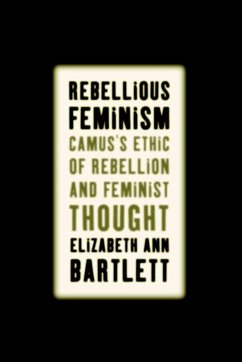In what might seem an unusual pairing, Barlett brings together the insights of Albert Camus and feminist thought, and in doing so sheds new light on both. Looking through a Camusian lens, Bartlett reveals a 'rebellious feminism' that simultaneously refuses oppression and affirms human dignity in solidarity with concrete, diverse others and the earth, giving us new insights into this life-affirming ethic.
Hinweis: Dieser Artikel kann nur an eine deutsche Lieferadresse ausgeliefert werden.
Hinweis: Dieser Artikel kann nur an eine deutsche Lieferadresse ausgeliefert werden.
"Placing feminist thought in dialogue with Camus' ethic of rebellion, Bartlett uncovers an 'auspicious coincidence' that will be a boon to philosophers, political scientists, social movement theorists, and feminists alike. Camus' rebellion is a strategy for resisting oppression while affirming a politics of justice and beauty, friendship and healing. With passionate clarity, Bartlett's Rebelious Feminism describes a way to live decently in the world." - Greta Gaard, Ph.D., author of Ecological Politics: Ecofeminists and the Greens, editor of Ecofeminism: Women, Animals, Nature and co-editor of Ecofeminist Literary Criticism
'Elizabeth Bartlett has found an 'auspicious coincidence' between feminism and Camus's rebellion against an absurd world begging for meaning. Both feminism and Camus plead for a just world in which love can thrive. Rebellion is not simply about the rejection of oppression but the affirmation of human dignity. Bartlett's illuminating analysis of Camus has helped me better appreciate feminism's message about empowering and freeing oneself within the limits of one's circumstances. Even if we cannot, as Camus writes, '...prevent the world from being a world in which children are tortured...we can reduce the number of tortured children...'' (Camus, The Rebel, 30) - Rosemarie Tong, PhD, Director, Center for Professional and Applied Ethics, Distinguished Professor in Health Care Ethics, Department of Philosophy, UNC Charlotte
'Elizabeth Bartlett has found an 'auspicious coincidence' between feminism and Camus's rebellion against an absurd world begging for meaning. Both feminism and Camus plead for a just world in which love can thrive. Rebellion is not simply about the rejection of oppression but the affirmation of human dignity. Bartlett's illuminating analysis of Camus has helped me better appreciate feminism's message about empowering and freeing oneself within the limits of one's circumstances. Even if we cannot, as Camus writes, '...prevent the world from being a world in which children are tortured...we can reduce the number of tortured children...'' (Camus, The Rebel, 30) - Rosemarie Tong, PhD, Director, Center for Professional and Applied Ethics, Distinguished Professor in Health Care Ethics, Department of Philosophy, UNC Charlotte








